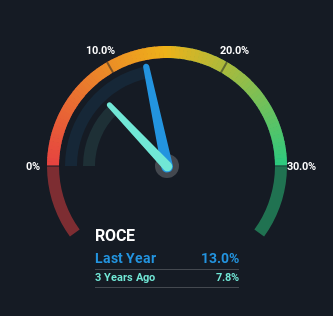- United Kingdom
- /
- Aerospace & Defense
- /
- LSE:RR.
Returns At Rolls-Royce Holdings (LON:RR.) Are On The Way Up
If we want to find a stock that could multiply over the long term, what are the underlying trends we should look for? One common approach is to try and find a company with returns on capital employed (ROCE) that are increasing, in conjunction with a growing amount of capital employed. Basically this means that a company has profitable initiatives that it can continue to reinvest in, which is a trait of a compounding machine. So when we looked at Rolls-Royce Holdings (LON:RR.) and its trend of ROCE, we really liked what we saw.
Understanding Return On Capital Employed (ROCE)
Just to clarify if you're unsure, ROCE is a metric for evaluating how much pre-tax income (in percentage terms) a company earns on the capital invested in its business. The formula for this calculation on Rolls-Royce Holdings is:
Return on Capital Employed = Earnings Before Interest and Tax (EBIT) ÷ (Total Assets - Current Liabilities)
0.13 = UK£2.3b ÷ (UK£33b - UK£15b) (Based on the trailing twelve months to June 2024).
Thus, Rolls-Royce Holdings has an ROCE of 13%. In absolute terms, that's a pretty normal return, and it's somewhat close to the Aerospace & Defense industry average of 14%.
View our latest analysis for Rolls-Royce Holdings

Above you can see how the current ROCE for Rolls-Royce Holdings compares to its prior returns on capital, but there's only so much you can tell from the past. If you'd like to see what analysts are forecasting going forward, you should check out our free analyst report for Rolls-Royce Holdings .
What Does the ROCE Trend For Rolls-Royce Holdings Tell Us?
Rolls-Royce Holdings has broken into the black (profitability) and we're sure it's a sight for sore eyes. The company was generating losses five years ago, but has managed to turn it around and as we saw earlier is now earning 13%, which is always encouraging. While returns have increased, the amount of capital employed by Rolls-Royce Holdings has remained flat over the period. So while we're happy that the business is more efficient, just keep in mind that could mean that going forward the business is lacking areas to invest internally for growth. After all, a company can only become a long term multi-bagger if it continually reinvests in itself at high rates of return.
On a separate but related note, it's important to know that Rolls-Royce Holdings has a current liabilities to total assets ratio of 46%, which we'd consider pretty high. This can bring about some risks because the company is basically operating with a rather large reliance on its suppliers or other sorts of short-term creditors. Ideally we'd like to see this reduce as that would mean fewer obligations bearing risks.
The Bottom Line On Rolls-Royce Holdings' ROCE
To bring it all together, Rolls-Royce Holdings has done well to increase the returns it's generating from its capital employed. And with the stock having performed exceptionally well over the last five years, these patterns are being accounted for by investors. Therefore, we think it would be worth your time to check if these trends are going to continue.
Since virtually every company faces some risks, it's worth knowing what they are, and we've spotted 3 warning signs for Rolls-Royce Holdings (of which 2 don't sit too well with us!) that you should know about.
For those who like to invest in solid companies, check out this free list of companies with solid balance sheets and high returns on equity.
New: AI Stock Screener & Alerts
Our new AI Stock Screener scans the market every day to uncover opportunities.
• Dividend Powerhouses (3%+ Yield)
• Undervalued Small Caps with Insider Buying
• High growth Tech and AI Companies
Or build your own from over 50 metrics.
Have feedback on this article? Concerned about the content? Get in touch with us directly. Alternatively, email editorial-team (at) simplywallst.com.
This article by Simply Wall St is general in nature. We provide commentary based on historical data and analyst forecasts only using an unbiased methodology and our articles are not intended to be financial advice. It does not constitute a recommendation to buy or sell any stock, and does not take account of your objectives, or your financial situation. We aim to bring you long-term focused analysis driven by fundamental data. Note that our analysis may not factor in the latest price-sensitive company announcements or qualitative material. Simply Wall St has no position in any stocks mentioned.
About LSE:RR.
Rolls-Royce Holdings
Develops and delivers mission-critical power systems in the United Kingdom and internationally.
Flawless balance sheet with proven track record.
Similar Companies
Market Insights
Weekly Picks

Solutions by stc: 34% Upside in Saudi's Digital Transformation Leader


The AI Infrastructure Giant Grows Into Its Valuation
Recently Updated Narratives


The "Landlord of Orbit" – A Deep Value Play Ahead of the Starlab Era


The "AI-Immunology" Asymmetric Opportunity – Validated by Merck (MSD)


The Hidden Gem of AI Hardware – Solving the Data Center Bottleneck
Popular Narratives


MicroVision will explode future revenue by 380.37% with a vision towards success


NVDA: Expanding AI Demand Will Drive Major Data Center Investments Through 2026



